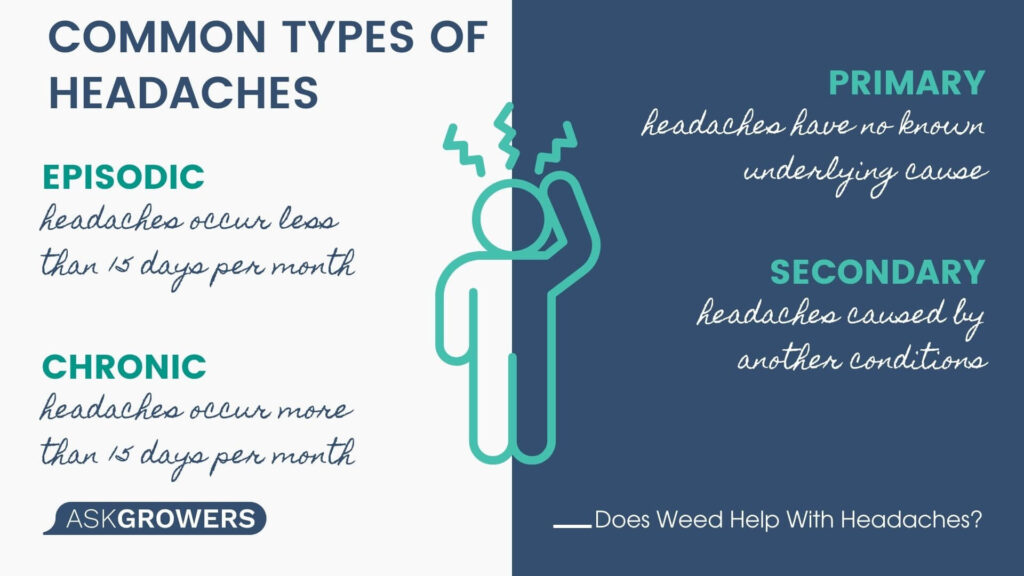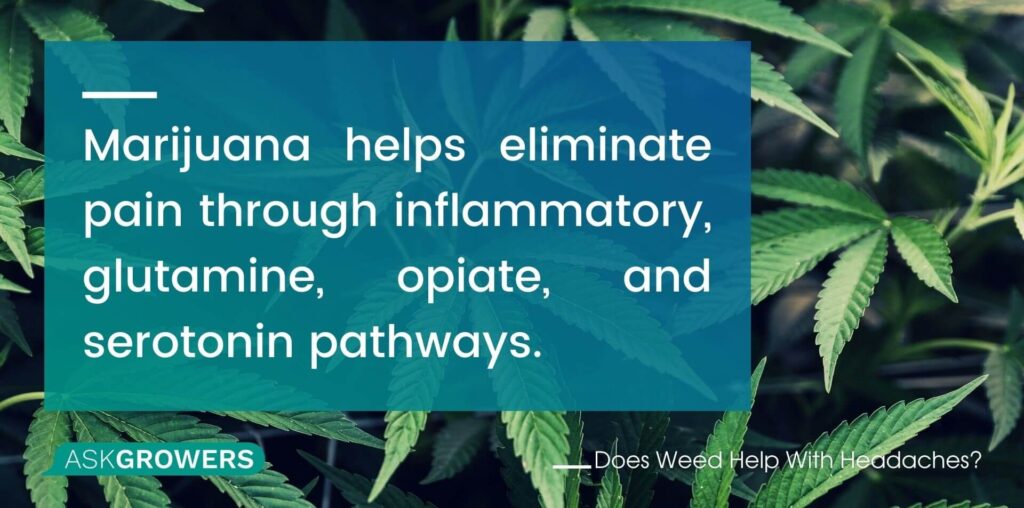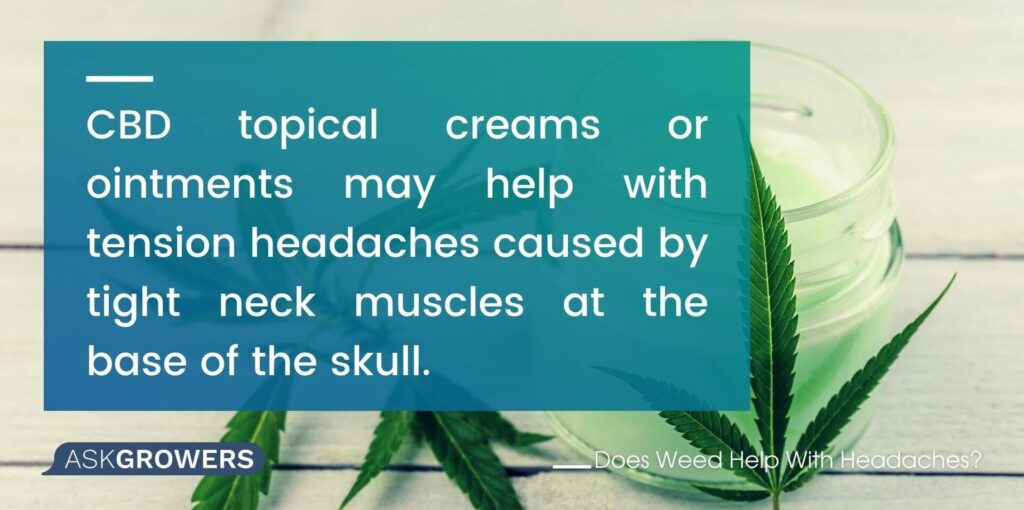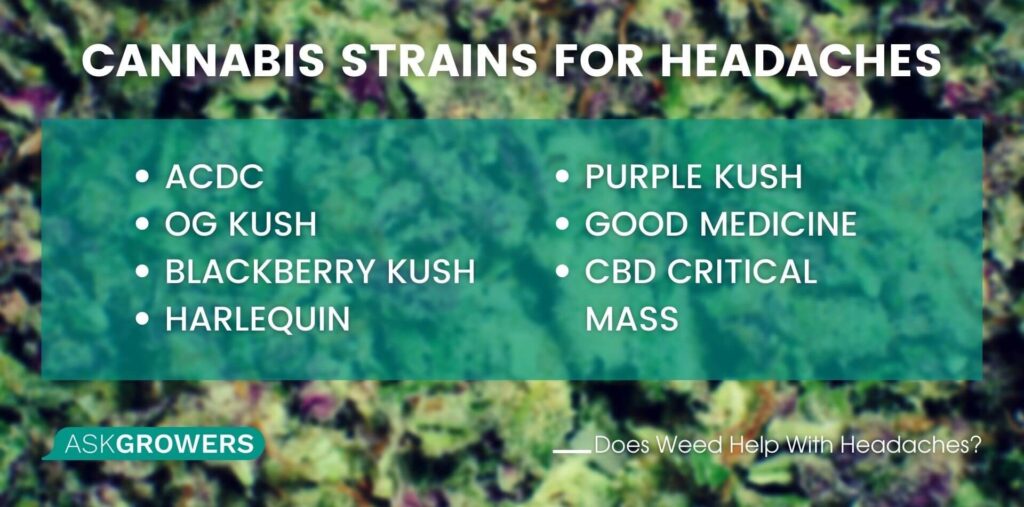
Does Marijuana Help With Headaches?
This article originally appeared on AskGrowers.com and has been reposted, unedited, with permission.
The definition of headache is throbbing or constant pain arising from any region of the head, as well as the face or neck. Headaches can severely aggravate your quality of life. They make you irritated, tired, absent-minded, and unable to engage in your daily activities to the full extent. Even simple tasks such as shopping, watching a TV, typing, driving, etc., can turn out to be a nightmare when you suffer from a headache.
Some types of headaches, such as cluster headaches, migraines, hemicrania continua, thunderclap headaches, and others, may be tough to cope with, as they last longer and have more severe symptoms and intensity.
Photo by fizkes/Getty Images
RELATED: What Is THC-O And Why Is This Psychedelic Cannabinoid 3x Stronger Than THC?
In many cases, headaches can be relieved by taking an over-the-counter pain killer, resting, or reducing neck tension (a nice massage is always a good option). Unfortunately, common drug and non-drug interventions are not always helpful. Medications may be ineffective and cause side effects in some patients, leaving them one on one with their pain. However, it does not mean that pain is inescapable, as there are effective ways to relieve it through marijuana use.
The use of marijuana for migraine treatment has been widely reported in scientific literature. For example, a 2020 scholarly research by Cuttler and colleagues found that cannabis can reduce headaches and migraines by half. “Yes, even migraines!” confirms Tom Stevenson, CEO of Bonsai Cultivation. According to Stevenson, marijuana has a strong positive effect if used correctly and in appropriate dosages. This article explains why people can use cannabis for migraines and other types of headaches and what types are best for this purpose.
DISCLAIMER: This article is not intended to substitute professional medical advice but serves only for informing the audience. If you have a severe headache accompanied by other symptoms or cannot relieve it with available medications, we strongly recommend consulting with a healthcare professional.
Most Common Types of Headaches
Before we dwell in more detail on the pain-killing properties of weed, let’s discuss the most common types of headaches that can be addressed through marijuana use. Headaches are typically divided into two main groups:
- Episodic headaches
- Chronic headaches
The former group includes headaches that occur occasionally but no more than 15 days a month. They are usually milder than chronic headaches, which occur more often and are associated with severe pain that is difficult to manage.
Experts from Stanford Health Care explain that all headaches can also be divided into primary and secondary. Primary headaches are not a symptom of a more serious condition or disease. They occur due to the inflammation of pain-sensitive parts of the head and neck caused by unfavorable lifestyle factors (e.g., alcohol abuse, sedentary lifestyle, lack of sleep). Primary headaches can be easily treated with painkillers, including marijuana. According to Sheila Dedenbach from Heavenly Sweet, “Cannabis has anti-inflammatory and analgesic properties that help with headaches and is also a natural neuroprotector (our federal government holds patents for this very use), helping reduce the production of damage-causing compounds.”

Examples of primary headaches reported most often include the following:
- Migraine
- Tension headache
- Cluster headache
- Hypnic headache
However, headaches are not limited to these types. They can be caused by different factors (e.g., caffeine use, menstruation, etc.) and affect different brain parts.
Secondary headache signifies some serious problem in the brain. It can be addressed only by treating the underlying cause, such as a tumor, brain injury, aneurism, etc. Secondary headaches are excruciating and sudden, and they often require urgent care. Does marijuana help with headaches of this type? Although using marijuana in the case of secondary headaches to relieve pain may be dangerous and ineffective, someone who is undergoing treatment for a brain tumor can find cannabis to be helpful to alleviate symptoms.
How Exactly Does Weed Help With Headaches?
So, how exactly can weed help headaches? Scientific studies have shown that marijuana helps eliminate pain through inflammatory, glutamine, opiate, and serotonin pathways. Cannabis also possesses dopamine-blocking properties, helping to improve negative mood states in conditions such as anxiety, depression, and recovery from addiction.

How does weed help with headaches on the physiological level? The effects of weed on the human body are better understood if one looks closer at the so-called endocannabinoid system. This system located in the brain and spinal cord regulates numerous physiological processes, such as:
- Inflammation
- Pain
- Stress regulation
- Metabolism
- Synaptic plasticity
- Thermogenesis
- Neural development, etc.
Cannabinoid 1 (CB1) and 2 (CB2) receptors constitute the core of this system. Cannabis modulates CB1 and CB2 during weed consumption, resulting in positive health effects such as relaxation and pain relief.
The best thing about all this is that marijuana can be used differently, depending on the severity of pain and personal preferences. The primary use of cannabis is via smoking, but vaporization and dabs are also very popular. Products using edible, oil-based, and topical forms of cannabis are also becoming more popular. They are widely used as first-line methods against headaches. Dried cannabis flowers, cannabinoid-rich oils, and topical products may effectively treat migraines and headache-related pain.
Experts confirm the effectiveness of different cannabis forms. Here are two excerpts illustrating it:
“Yes! Even topicals can help. Our Balm is extremely powerful for headaches, just rub it on your temples and back of your neck” – Laurel (Lo) Friesen, Founder and CEO of Heylo Cannabis.
“Yes! We’ve made our own homemade salve that we use as a headache balm. It provides immediate relief!” – Melissa Beseda, Founder and Co-Owner of Wildwood Flower Farm.
Another vital thing to know about cannabis is that its effects can be maximized when it is combined with other treatments and wellness practices. Sam McAdam from Floravega confirmed that it does not work in isolation: “While cannabis has been reported to aid in headaches, users must also take other factors into consideration such as hydration, nutrition, sleep, etc., and use cannabis in collaboration with overall wellness practices to feel their best.” Luc Krol from the Amsterdam Seed Center agreed and added: “Yes. Weed can help to get rid of a headache, depending on what kind of headache. For a hangover, smoke weed and DRINK WATER 😉”
So, don’t expect that cannabis will instantly relieve pain and prevent future headaches because much depends on individual sensitivity, which is not yet fully understood. However, smoking marijuana in appropriate dosages and frequency can bring significant health benefits if you stick to a healthy lifestyle.
CBD Headache Treatment
Not all active ingredients contained in marijuana have the same effect and application for headache treatment. Cannabidiol (CBD), which is mainly used in the form of CBD oil, has been a popular remedy for headaches. This legally available, non-intoxicating ingredient has powerful anti-inflammatory properties and is not habit-forming, so you get all the benefits without health risks.
Research on CBD effects is scarce, but anecdotal evidence shows that rubbing CBD oil for migraines onto your forehead may have a desired calming and pain-killing effect. For example, CBD topical creams or ointments may help with tension headaches caused by tight neck muscles at the base of the skull. CBD may also reduce headaches’ symptoms, such as light and sound sensitivity and nausea.

Does CBD help migraine? Evidence to answer this question is lacking. However, CBD for migraines combined with other treatment options may bring optimal outcomes. For example, Anthony Bear, CEO of Bear Blend, acknowledged the positive effects of CBD on headaches and recommended complementing it with body practices: “It really depends on the person and the cause of the headaches. I would recommend long-term silent meditation to deal with chronic headaches.”
Read Also: Does CBD Affect the Brain and Memory?
THC Headache Treatment
Tetrahydrocannabinol (THC) is another active ingredient of weed that positively affects headaches. However, it is not generally used for reducing pain on its own. THC and CBD are often combined to both prevent and treat headaches. Combining these components acts as good prophylaxis against headaches and relieves pain in acute headache cases. In fact, scholars found that CBD and THC combined are as effective as amitriptyline.
However, the optimal CBD to THC ratio may vary depending on the pain severity and individual characteristics. Akasha Ellis, the Co-Founder and Farm and Operations Lead of Ventura Seed Company, stated: “I tend to take a much higher amount of CBD to THC. And does again allow me to relax and get a good night’s rest.”
A word of caution about HTC is required, though. In some people, THC consumption may lead to addiction. Although many people don’t believe this, but it’s a well-established fact. A lot of work is focused on parental THC exposure effects on the offspring of users, which is especially vital for pregnant women who don’t wish to take meds for headaches.
Top 7 Cannabis Strains For Headaches
It is difficult to determine which cannabis strains and cannabinoid compounds are more effective for specific headache types. It all depends on multiple factors, so it makes sense to try different strains and dosages to find the option that works for you. Here is the list of cannabis strains that AskGrowers.com recommends to start with:

ACDC
This CBD-based strain has strong anti-inflammation effects, which explain its usefulness as a painkiller during headache episodes. It is widely used for relieving pain because, unlike many other strains, ACDC allows a person to stay focused and productive. So, if you are looking for pain relief and do not need psychoactive effects, ACDC may be the best option for you.
OG Kush
This strain also has enough CBD to reduce pain and inflammation. Accessibility is its main benefit, as you can easily find it in any local dispensary. It would be best to use this strain before the pain becomes full-blown.
Blackberry Kush
This stain contains more THC than CBC. Unlike ACDC, it can cause a powerful feeling of euphoria, which distracts from pain and relieves the muscles.
Harlequin
This weed strain has a balanced THC/CBD ratio, so you can enjoy its calming and pain-relieving effects without having to worry about a foggy mind and sedative effects. If you need to decrease pain to be able to complete your work or study, Harlequin is a good option. It will keep you alert and concentrated and remove the uncomfortable throbbing feeling in your head. Like OG Kush, Harlequin is most beneficial when taken soon after the first symptoms of headache occur.
Purple Kush
People suffering from migraines know how exhausting pain can be and how difficult it is to fall asleep when it is bothering you. Purple Kush is the weed strain most useful for people facing both pain and sleep disturbance. Dominated by THC, Purple Kush makes the body relax, which is crucial for falling asleep. However, this strain won’t take the pain away quickly, so it’s best to use it when you have time to relax and wait for the much-desired relaxation.
Good Medicine
A cross-breed between Appalachian and Harlequin, this strain boasts a perfect balance between CBD and THC. It means that it can both relieve pain effectively and help with sleep. It is excellent for those willing to remain active and focused throughout the day while also enjoying a good rest at night.
CBD Critical Mass
This is another THC/CBD balanced strain reducing inflammation and pain associated with headaches. You will get a gentle euphoria and mild pain relief, just enough to keep you going.
Can Weed Cause Headaches?
Although marijuana has a milder effect on pain than medications, it should not be overused. The problem is that weed consumption may either relieve pain or cause it. James from TJ’s Gardens explained: “I have heard this can go both ways – all dependent on the individual and the particular cultivar.”
Long-term modulation of CB1 receptors in the central nervous system due to regular marijuana use was found to increase the risk of headaches caused by medication overuse and rebound headaches in specific populations. Prolonged periods of exposure to marijuana or weed consumption in high doses may diminish the effectiveness of treatment. Situations causing rebound headaches include but are not limited to the following:
- Increasing the dose too fast
- Regularly exceeding recommended doses
- Discontinuing treatment after prolonged (more than 1-month-long) use
Other scholars doubt that cannabis causes overuse headaches, making it superior to more conventional treatments. However, evidence in this regard is inconsistent. Until more evidence is available, it is better to reduce marijuana use and pay more attention to how pain manifests itself and in what situations. For example, pain occurring or intensifying after cannabis use may point to its overuse or improper use.
Conclusion
Headache pain can be debilitating and exhausting. It drains your energy and makes you feel dizzy and weak. If you do not want to take over-the-counter painkillers for some reason, marijuana may help you relieve pain. Does weed help headaches? Absolutely! It can reduce pain and provide some additional benefits, such as relaxation, calmness, improved sleep, and many others.
Finding the right THC/CBD and a suitable weed strain is important for enjoying the optimal benefits of marijuana. However, we discourage you from experimenting without consulting a healthcare specialist or your physician first. More importantly, if you have excruciating pain and other symptoms, which occur suddenly, it is better to ask for professional help.
This article originally appeared on AskGrowers.com and has been reposted, unedited, with permission.

Post a comment: